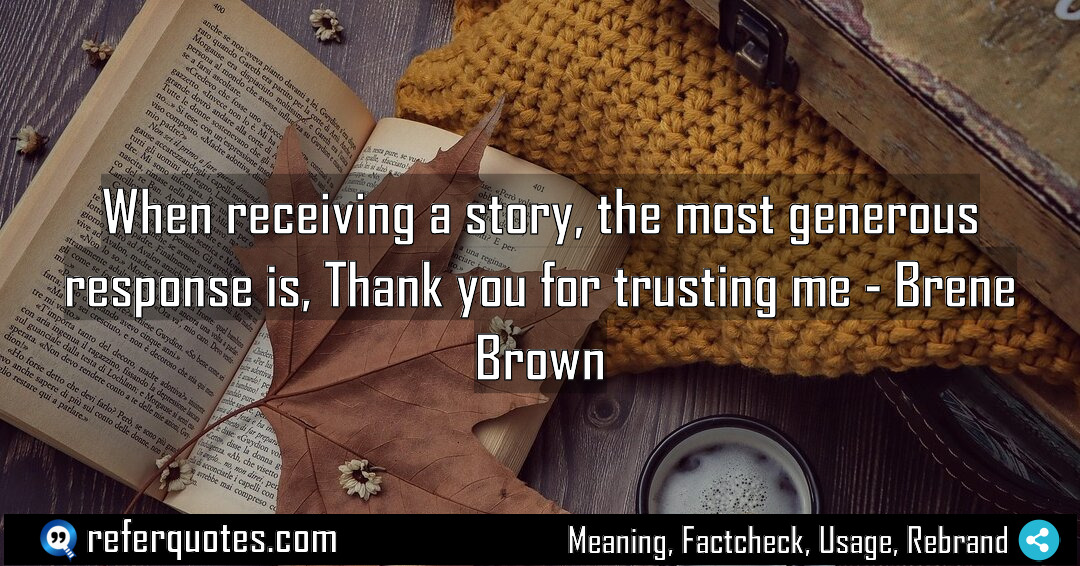
When receiving a story, the most generous response is… a simple thank you for the trust. It sounds simple, but this Brene Brown insight flips our entire approach to listening on its head. Let’s break down why this is such a game-changer for real connection.
Share Image Quote:
Table of Contents
Meaning
At its core, this quote tells us that the real gift in any shared story isn’t the information—it’s the vulnerability behind it. The most powerful thing you can do is acknowledge that trust directly.
Explanation
Okay, let me explain why this is so profound. Our default setting when someone shares something hard or personal is to jump into fix-it mode. We offer advice, we relate with our own story, we try to solve the problem. But what Brene is pointing out is that all of that, however well-intentioned, actually sidesteps the most critical moment. The moment of trust.
When you simply say, “Thank you for trusting me with that,” you do something magical. You validate their courage. You hold the space instead of trying to fill it. You’re essentially saying, “I see the risk you just took, and I honor it.” This is what builds real, unshakable connection. It’s not about having the right answer. It’s about being the right kind of witness.
Quote Summary
Reading Level42
Aesthetic Score64
Origin & Factcheck
This wisdom comes straight from Brené Brown’s 2004 book, Women & Shame: Reaching Out, Speaking Truths and Building Connection. It’s a key concept from her early research, long before her famous TED Talks. You sometimes see it misattributed to other authors, but its home is firmly in her foundational work on shame and vulnerability.
Attribution Summary
Author Bio
Dr Brene Brown is the author of books such as Daring Greatly and The Power of Vulnerability. The TED talk and Netflix production based on her research reached out to millions of audience. She researches effects of courage and vulnerability in shaping people's work and relationships. She leads the Brené Brown Education and Research Group and provides evidence-based insights into practical tools to help people train themselves
Official Website |Facebook | X | Instagram | YouTube |
Where is this quotation located?
| Quotation | When receiving a story, the most generous response is, Thank you for trusting me |
| Book Details | Publication Year: 2004; (other edition details unknown) |
| Where is it? | Approximate page from 2004 Hazelden edition, Section: Receiving Stories |
Context
In the book, this idea is nestled within her exploration of how shame thrives in silence and secrecy. The “thank you for trusting me” response is presented as an antidote to shame. It’s the first step in creating the empathetic, safe environment where people feel seen and heard, which is the very environment where shame cannot survive.
Usage Examples
So how do you actually use this? It’s a practice. Here are a few ways it shows up.
- For a Manager: An employee admits a big mistake. Instead of focusing solely on the error, you start with, “I know that was difficult to share. Thank you for trusting me with this so we can handle it together.” It transforms a reprimand into a partnership.
- For a Friend: Your friend finally tells you about their struggle with anxiety. Before you say “I know how you feel,” try, “Thank you for trusting me with that. It means a lot.” It grounds the conversation in your relationship, not just the problem.
- For a Parent: Your teenager confesses they’re being bullied. Your first words? “Thank you for telling me. I know that took a lot of courage.” This immediately reinforces that coming to you was the right thing to do.
This is for anyone who wants to be a better leader, partner, friend, or parent. It’s a universal tool for deeper connection.
To whom it appeals?
Share This Quote Image & Motivate
Motivation Score70
Popularity Score72
Shareability Score70
Common Questions
Question: Does this only work for heavy, serious stories?
Answer: Not at all. It works for any moment of vulnerability, big or small. A colleague sharing a new, untested idea is an act of trust. Acknowledging it encourages more innovation and psychological safety.
Question: What if it feels awkward or scripted to say?
Answer: It will feel awkward at first! Any new habit does. Start small. The goal is the genuine sentiment behind the words. “That means a lot that you’d tell me,” works just as well. The key is to acknowledge the trust, not recite a line.
Question: Isn’t this just avoiding giving people the advice they need?
Answer: This is the biggest misconception. You’re not avoiding advice. You’re setting the stage for it to actually be heard. By first honoring the trust, you create a receptive and calm space. The problem-solving conversation that follows will be infinitely more productive because the person feels safe, not defensive.
Similar Quotes
Good stories make promises, but great ones actually deliver. It’s the difference between grabbing attention and building a legacy. This simple idea flips how we think about marketing and connection.…
You know, “The truth is elusive, but a great story can be trusted” is one of those lines that completely reframes how you think about communication. It’s not about facts;…
You know, the best stories promise something people already want to believe. It’s not about creating a new reality, but about framing the one they’re already leaning towards. It’s the…
If the story is worth believing, people will forgive your imperfections. It’s a game-changing insight that flips traditional marketing on its head. Authenticity, not perfection, is what truly builds connection…
Authentic stories make us feel safe and connected. It’s a simple truth that separates brands that build tribes from those that just make noise. When you get this right, everything…
